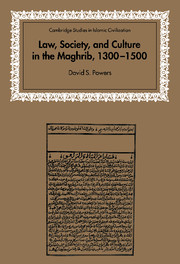Book contents
1 - Kadijustiz or Qāḍi-Justice? A Paternity Dispute from Fourteenth-Century Morocco
Published online by Cambridge University Press: 05 July 2014
Summary
The United States Supreme Court does not sit like a kadi under a tree dispensing justice according to considerations of individual expediency.
(Justice Felix Frankfurter)The image of the Muslim qāḍī comfortably dispensing justice without reference to any body of legal principles or rules is shared by many laymen and not a small number of specialists. Weber defined kadijustiz as a System of law in which judges are empowered to decide each case according to what they see as its individual merits, without referring to a settled and coherent body of norms or rules and without employing a rational set of judicial procedures. In Weber's view, the qādī's judgments were driven by considerations relating to politics, ethics, personal expediency, and/or general Utility.
Based on his study of judges serving in the town of Sefrou, Morocco, in the 1960s and 1970s, Rosen has attempted to refine and qualify Weber's thesis by detaching the notion of doctrine from that of consistency. Like Weber, he argues that Muslim judges do not focus on Substantive legal doctrines or on the similarities to, and differences from, the facts of prior cases; do not emphasize antecedent concepts; and do not employ a mode of judicial reasoning that would result in increasingly refined modes of legal analysis. Unlike Weber, however, Rosen contends that Islamic law is rational and consistent, although dependent in these respects on the skill with which the qāḍī interprets the testimony of reliable witnesses, analyzes oral testimony, assesses competing social interests, and relies upon local experts.
- Type
- Chapter
- Information
- Law, Society and Culture in the Maghrib, 1300–1500 , pp. 23 - 52Publisher: Cambridge University PressPrint publication year: 2002



